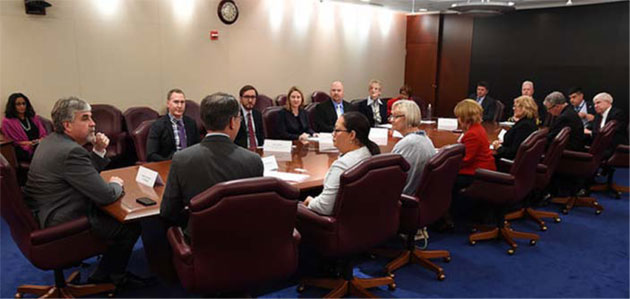JDRF and HHS Discuss Type 1 Diabetes Priorities

In March, JDRF advocates took to Capitol Hill to thank Congress for passing a two-year, $300 million renewal of the Special Diabetes Program (SDP). This week, we continued our advocacy for the type 1 diabetes (T1D) community during a meeting with Eric Hargan, Deputy Secretary of the U.S. Department of Health and Human Services (HHS). JDRF was one of a half dozen patient advocacy groups that met to discuss how HHS can address the cost of prescription drugs and other concerns.
Source: U.S. Department of Health and Human Services
Brian Davis, a JDRF advocate who was diagnosed at age 28 and whose son was diagnosed at 11 months old, attended the meeting with Cynthia Rice, JDRF’s Senior Vice President of Advocacy and Policy, to discuss the challenges our community faces and how JDRF and HHS can work together to address them.
Brian told Deputy Secretary Hargan what it is like to live with T1D and to have a young family member living with the disease. Brian and his son, Joshua, both wear continuous glucose monitors, but he explained how every night at midnight and 3 a.m., Brian wakes up his son to check his blood sugar. He stressed how families that live with T1D are just like any other family, but how Joshua misses time in school, on the soccer field, on the playground, and in other aspects of his life to manage his T1D.
Our goal: Make living with T1D more predictable and affordable
We know that insulin is not a cure – Brian calls the drug “life support” – and costs have gone up in recent years on the drugs and devices that people with T1D need. JDRF is focused on solutions, including low, predictable out-of-pocket costs that will improve access and affordability. Brian explained to Deputy Secretary Hargan the importance of making sure insulin is affordable to those who need it by noting that his family is enrolled in a high deductible plan that requires them to pay 100 percent of costs up front, until the deductible is met. Even when the deductible is reached, Brian and his family are still responsible for a portion of the costs, a challenge familiar to many in the T1D community. Brian asked Deputy Secretary Hargan to make changes that will lower out-of-pocket costs and make costs more consistent throughout the year.
Brian and Joshua both participated in artificial pancreas (AP) system clinical trials at the University of Virginia, which were funded by the SDP. Brian thanked the government for funding research on AP systems and accelerating FDA approval and said the technology has been life changing for his family. AP systems are now covered by private health plans, but Brian asked for help getting these devices covered by Medicare and Medicaid so everyone with T1D can benefit.
The work continues
We appreciate the opportunity to share our priorities with Deputy Secretary Hargan, and we look forward to working with HHS to ensure access to the most effective T1D treatments and therapies.
JDRF is the link between research breakthroughs and the T1D community, demanding better coverage for the disease under Medicare and taking on insurers for access to affordable insulin and new technologies. We keep the pressure on so people with T1D can take advantage of innovation, and our work continues to advocate for reforms that make insulin available at a reasonable out-of-pocket cost.
You can learn more about our priorities by visiting our 2018 Advocacy Agenda. Join us as we advance toward a world without T1D.